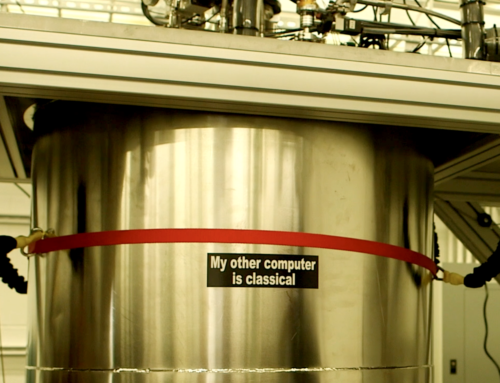Feature image via MIT Technology Review
Remember when you found out someone might be spying on you through your webcam? Imagine how you’ll feel when a quantum computer breaks encryption, leaving your personal data, banking information—and who knows what else?—exposed and open to manipulation.
This is one of the worst fears about the nightmarish potential of quantum computers. It’s up there with drone swarms and Matrix-style artificial intelligence (AI).
The weirdness of quantum makes great clickbait, so opinions on quantum computing tend to be either apocalyptic or revolutionary—but the media hype can be misleading. The truth about quantum computing is far more complex than the catchy headlines suggest. Like anything else, it’s not black and white. The reality lies in the grey areas.
Today, quantum computers are feared for what we know about them and for what we don’t know about them; for their ability to break encryption, for the security threats they pose, and for the power boost they will give other technologies, like AI. All of this uncertainty begs the question—should we be afraid of quantum computers?
What is a quantum computer?
Regular computers, from your laptop to the most powerful supercomputers, operate using binary (meaning one or the other) digits, known as bits. Binary computing systems work great for most things. What they’re not great at is predicting complex phenomena, like chemical reactions, global weather patterns, or financial markets.
Enter quantum computers. Quantum computing is based on the “weird” qualities of quantum mechanics, a theory of physics that describes what happens in the universe on a subatomic scale where the laws of classical physics no longer apply.
Quantum computers harness the strange laws of quantum mechanics to massively increase computational power, allowing them to quickly solve problems that would take a regular computer thousands of years to compute. They encode information as quantum bits, or qubits for short. Qubits are unique because unlike normal bits, they aren’t binary—they can exist in two different states at once. This state of superposition, that allows qubits to be in two states simultaneously, is just one of the weird laws of quantum mechanics that makes a quantum computer function.
There are plenty of potential benefits of quantum’s souped-up power. Quantum computers could help us develop better cancer-fighting drugs, prepare for natural disasters before they hit, or make algorithms more objective. But quantum computing is still in its infancy. For all the hype, today’s quantum devices can’t really do anything useful yet. Currently, the most powerful quantum computers have less than 100 qubits; to function properly, they’ll need millions.
This is where quantum physicists run into a big problem. The more qubits you add to a quantum computer, the more unstable the machine becomes. That’s why, unlike your laptop which can do anything from post a Tweet to make a PowerPoint presentation with ease, today’s quantum computers can only be programmed to solve very specific mathematical problems. They can’t really do much else. By most estimates, useful quantum computers are at least a decade away.
Futuristic Fears
Hacking
One of the worst fears about quantum computers is their ability to break encryption. Imagine you log into your bank account one day, only to find your account completely empty—your life savings gone. Your strong password and two-factor authentication never stood a chance against a hacker with access to a quantum computer. Even the super-secure blockchain technology that protects bitcoin won’t be enough to protect against a quantum computer.
Luckily, a random hacker isn’t likely to get their hands on a quantum computer any time soon. And in the meantime, technical solutions to this problem, like quantum-safe encryption, are being developed. Even better news—these solutions are far easier to develop than quantum computers are to build. Still, the big security challenge will likely be a human one—not a technical one. Will we be able to get our digital security systems ready, from banking to government databases, for a “post-quantum” world fast enough?
A Global Power Play
The development of quantum computers is unfolding as a race between superpowers, with both public and private sector teams running the race. Though many countries have programs to fund the development of quantum computers, the U.S. and China are lead competitors.
It’s not hard to understand why international superpowers are racing to build a quantum computer—whoever gets there first will have massive security and military advantages. They’ll have the ability to shut down the electricity grid of an entire city or uncover military secrets faster than you can tie your shoelaces. Hacking your bank account probably won’t be high on their list of priorities.
As competition is fierce, it often overshadows the international collaboration that goes on in the quantum sciences. Far from a quantum arms race, the effort to build useful quantum computers is marked by strategic, international cooperation between private sector companies, universities, and governments. International partnerships, like the recently announced Quantum Meta-Ethics project between Sydney’s Project Q and Delhi-based think tank Observer Research Foundation, are beginning to explore questions of global governance for the ethical use of quantum technologies.
Speeding up AI
We’re already seeing how much harm rogue AI can do. With the rise of machine learning we’ve witnessed how quickly fake news spreads across social media. From COVID conspiracies to Pizzagate, information boosted by social media algorithms can spread out of control. Quantum computing promises to supercharge already powerful AI, enabling machine learning to happen at hyperspeed.
Is that a problem? Potentially. A quantum computer could feed huge amounts of information into an algorithm extremely quickly, meaning the algorithm will learn from a broader sample size much more rapidly. But that could also mean more objective AI and more evolved algorithms, informed by a larger dataset, which in turn could help detect misinformation and better understand complex, real-world scenarios.
Schrodinger’s Quantum Computer
If this all sounds very complex and strange, that’s because it is. Physicists still don’t understand why quantum mechanics works. So really, if we’re going to be concerned about anything it should probably be the fact that vast amounts of money are being pumped into building futuristic devices based on science we don’t fully understand.
Depending on how you look at it, quantum computers will either be a huge opportunity or a huge threat. But what if they are both? If we’ve learnt anything from quantum theory, it’s that the only thing we can be certain of is uncertainty. So we can acknowledge the complexities of developing and applying new technologies while doing what we can to make sure they are used in responsible and ethical ways.
Ultimately, skepticism of quantum computing, like any emerging technology, is vitally important. Fear, on the other hand, achieves little.







Leave a Reply